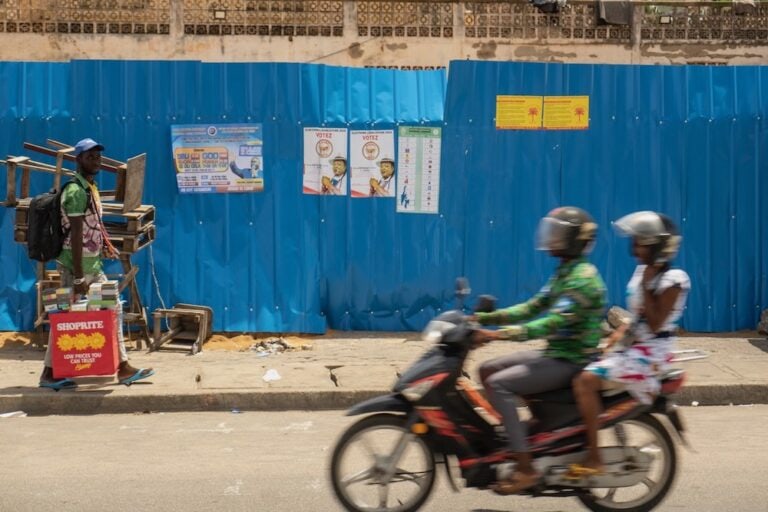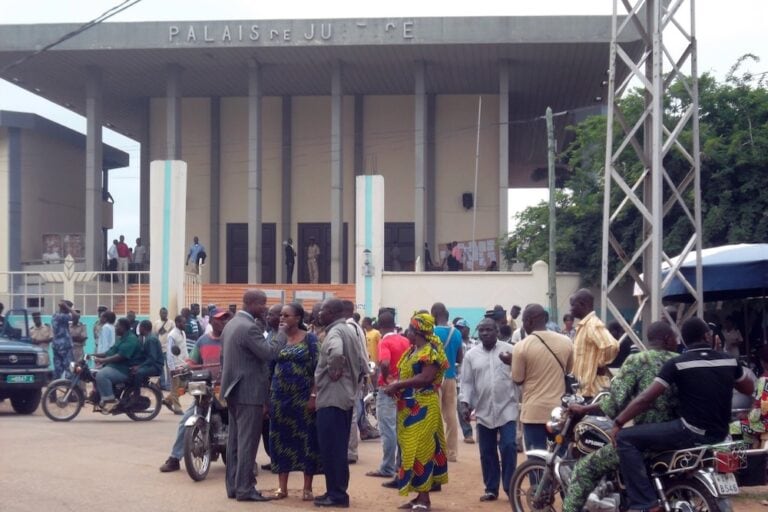(CPJ/IFEX) – In a 10 May 2000 letter to President Gnassingbe Eyadéma, CPJ stated that it was disturbed by the continued detention of Hippolyte Agboh, publisher of the private weekly “L’Exilé”, who is being prosecuted on criminal defamation charges. CPJ is equally concerned about the recent spate of reprisals against news organisations that have criticised […]
(CPJ/IFEX) – In a 10 May 2000 letter to President Gnassingbe Eyadéma, CPJ stated that it was disturbed by the continued detention of Hippolyte Agboh, publisher of the private weekly “L’Exilé”, who is being prosecuted on criminal defamation charges. CPJ is equally concerned about the recent spate of reprisals against news organisations that have criticised the government.
In the early hours of 13 April, police raided newsstands in Lomé and seized that week’s edition of “L’Exilé”, according to CPJ’s sources in Togo. The raid was apparently prompted by an article titled “Rumours or Reality: One of President’s Daughters is Dead.” Quoting unnamed sources, the article incorrectly reported that the president’s daughter, Liling Gnassingbé, had been killed in a car accident earlier that week.
The next day, 14 April, the president summoned Agboh to his Lomé residence, where secret service agents questioned him for several hours. Agboh was arrested after his interrogation, and held at a local police station. On 15 April, he appeared before a judge at Lomé’s Correctional Tribunal. He was later charged with defaming the president’s daughter by disseminating false news. “L’Exilé”, meanwhile, has been unable to publish since mid-April due to severe police harassment, according to journalists in Togo.
Agboh’s trial opened on 8 May at Lomé’s Correctional Tribunal. The defence lawyer asked that all charges against Agboh be dropped, on the grounds that he should not be prosecuted for a simple professional error. The state prosecutor asked that Agboh be sentenced to a three-month prison term and ordered to pay a fine of 1 million CFA (US$2,000), under the new Press Code of 4 January. At the end of the hearing, the trial was adjourned to 15 May. Agboh was then handcuffed and driven to Lomé’s Civil Prison, where he remained as of 10 May.
While CPJ understands that the president might have been angered by a false news report about his daughter’s death, the organisation believes that journalists should never be jailed because of their work. A journalist’s job is to disseminate news and information, often gathered from sources throughout civil society and government. Deadline pressure, which is ultimately driven by society’s need for timely information about matters of public interest, may sometimes cause them to report inaccuracies in the information given them by these sources. In such cases, it is the journalist’s responsibility to publish a correction at the first opportunity.
CPJ noted that a functioning democracy depends on the uncensored exchange of information and ideas. Because news media play a vital role in this exchange, journalists should never face criminal prosecution for what they publish. Civil litigation, as outlined in Togo’s September 1992 Constitution, provides sufficient safeguards for any citizen, members of the president’s family included, whose reputation has been unfairly damaged by a press report. Moreover, CPJ believes that public officials, who govern by popular consent, must accept and even encourage scrutiny and criticism, including hostile criticism, and should only seek legal redress through civil action in the most extraordinary circumstances.
CPJ regrets that Togo’s Press Code of 4 January has replaced the widely-praised and far more reasonable 1998 press law. Violations of the new code are punishable by jail sentences of up to six months and fines as high as US$3,200. CPJ believes that the prosecution of journalists under this law will greatly inhibit the flow of information in Togo. Along with most journalists in Togo and the rest of the world, CPJ believes that criminal defamation statutes have no place in a democratic country.
In fact, statutes that criminalise speech are generally employed not to protect the reputations of those who have been defamed, but rather to suppress critical reporting on issues of legitimate public concern. Certainly, this has been the case in Togo. On 28 March, for example, security forces, citing the new press law, raided newsstands in Lomé and seized copies of the independent weekly “La Nouvelle Republique” to block further circulation of an article titled “Eyadéma, His Destiny and the Accords.” Written by an unnamed staff reporter, the story suggested that the people of Togo had grown weary of the president’s promises to promote democracy in the country.
On 29 March, police seized copies of the private weekly “Le Nouveau Combattant” in connection with the article “Counsel Occansey Speaks Out,” in which a prominent Lomé lawyer was quoted describing the president as an “illegal diamonds trader.” The article also quoted a 10 March United Nations report that accused the president’s government of bypassing a UN embargo in order to supply Jonas Savimbi’s UNITA rebel organisation in Angola with weapons in exchange for diamonds.
On 6 April, police stormed several Lomé newsstands and seized copies of the independent weekly “Crocodile” in connection with two stories in that week’s issue, one of which criticised the president’s son Ernest Gnassingbé, an officer in the Togolese army. The article quoted residents of the president’s hometown, Kara, where Gnassingbé was posted, condemning what they described as his “dictatorial” approach to local security issues.
In all these cases, government officials acted in accordance with the new Press Code. But the new Press Code violates Togo’s Constitution of September 1992, which specifically guarantees press freedom. It also violates Togo’s obligations under international covenants such as the Universal Declaration of Human Rights and the African Charter of People’s and Human Rights, which uphold the freedom of information and expression.
Recommended Action
Send appeals to the president:
– urging him to use his good offices to ensure that the Press Code of 4 January is repealed
– requesting that all charges against Agboh be unconditionally dropped
– calling on him to ensure that all journalists in Togo are free to seek, receive and impart information without fear of reprisals
Appeals To
APPEALS TO:
President Gnassingbe Eyadéma
Office of the President
Lomé, Togo
Fax: +228 21 20 40
Please copy appeals to the source if possible.
For further


